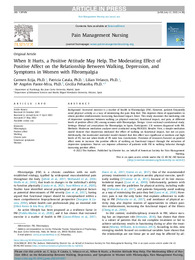Please use this identifier to cite or link to this item:
https://hdl.handle.net/11000/33515Full metadata record
| DC Field | Value | Language |
|---|---|---|
| dc.contributor.author | ECIJA-GALLARDO, Carmen | - |
| dc.contributor.author | CATALA, Patricia | - |
| dc.contributor.author | Velasco, Lilian | - |
| dc.contributor.author | Pastor-Mira, María Ángeles | - |
| dc.contributor.author | Peñacoba, Cecilia | - |
| dc.contributor.other | Departamentos de la UMH::Ciencias del Comportamiento y salud | es_ES |
| dc.date.accessioned | 2024-10-16T08:56:29Z | - |
| dc.date.available | 2024-10-16T08:56:29Z | - |
| dc.date.created | 2022-12 | - |
| dc.identifier.citation | Pain Management Nursing, Volume 23, Issue 6, December 2022, Pages 767-775 | es_ES |
| dc.identifier.issn | 1532-8635 | - |
| dc.identifier.issn | 1524-9042 | - |
| dc.identifier.uri | https://hdl.handle.net/11000/33515 | - |
| dc.description.abstract | Background: Increased exercise is a marker of health in fibromyalgia (FM). However, patients frequently avoid physical activity as a way of minimizing the pain they feel. This deprives them of opportunities to obtain positive reinforcement, increasing functional impact. Aims: This study examines the mediating role of depressive symptoms between walking (as physical exercise), functional impact, and pain, at different levels of positive affect (PA) among women with fibromyalgia. Design: Cross-sectional correlational study. Settings: Mutual aid associations for fibromyalgia in Spain. Participants: 231 women diagnosed with FM. Methods: Moderate mediation analyses were conducted using PROCESS. Results: First, a simple mediation model showed that depression mediated the effect of walking on functional impact, but not on pain. Additionally, the moderated mediated model showed that this effect was significant at medium and high levels of PA, but not when levels of PA were low. Conclusions: Provision of resources focused on positive affect seem to increase the positive effects of walking on functional impact through the reduction of depressive symptoms. Nurses can improve adherence of patients with FM to walking behavior through increasing positive affect. | es_ES |
| dc.format | application/pdf | es_ES |
| dc.format.extent | 9 | es_ES |
| dc.language.iso | eng | es_ES |
| dc.publisher | Elsevier | es_ES |
| dc.rights | info:eu-repo/semantics/openAccess | es_ES |
| dc.rights | Attribution-NonCommercial-NoDerivatives 4.0 Internacional | * |
| dc.rights.uri | http://creativecommons.org/licenses/by-nc-nd/4.0/ | * |
| dc.subject | Fibromyalgia | es_ES |
| dc.subject | Positive affect | es_ES |
| dc.subject | Walking | es_ES |
| dc.subject | Chronic pain | es_ES |
| dc.subject | Emotional symptoms | es_ES |
| dc.subject | Women | es_ES |
| dc.subject.other | CDU::1 - Filosofía y psicología::159.9 - Psicología | es_ES |
| dc.title | When It Hurts, a Positive Attitude May Help. The Moderating Effect of Positive Affect on the Relationship Between Walking, Depression, and Symptoms in Women with Fibromyalgia | es_ES |
| dc.type | info:eu-repo/semantics/article | es_ES |
| dc.relation.publisherversion | https://doi.org/10.1016/j.pmn.2022.05.007 | es_ES |

View/Open:
2022 Ecija et al When It Hurts Pain Managment Nursing.pdf
741,28 kB
Adobe PDF
Share:
.png)
